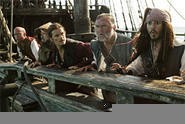POTC: AWE is a lukewarm maelstrom -- of secret agendas, double crossings, tricky alliances, back stabbings, familial complications, romantic entanglements, political conspiracies, warring factions, hidden gods, cheeky monkeys, and excessive eyeliner -- part of which is linked to events from the previous installments, part of which is freshly pulled out of the collective ass of director Gore Verbinski and writers Ted Elliott and Terry Rossio, and none of which is the least bit captivating or, by and large, comprehensible.
The story, such as it is, begins with the rescue of Jack Sparrow (Johnny Depp) from the Locker of Davy Jones (Bill Nighy), doomed captain of the Flying Dutchman, master of the crusty Fish Pirates, and owner of the most repellently vigorous facial hair in modern movies. The Locker, aka death, is a kind of 16th-century, white-on-white Matrix in which Sparrow, intuiting that he's the most entertaining figure in existence, hallucinates the antics of several dozen Sparrow doppelgängers while stranded beside the Black Pearl ship in an abstract expanse of desert.
Boring Will Turner (Orlando Bloom), plucky Elizabeth Swann (Keira Knightley), and blustery Captain Barbossa (Geoffrey Rush) effect his rescue through a keen understanding of the peculiar metaphysic ruling the Pirates universe: randomly generated nonsense. Thus, by plunging their vessel over a watery precipice, they are damply landed on a tropical beach, upon which legions of industrious crabs, neatly hatched from smooth white stones, are hustling the Black Pearl ship overland to meet the rescue party. Via another application of the Whatever Principle, our heroes will exit the Locker and embark in the direction of additional inexplicabilities.
Ah, but I have forgotten Captain Sao Feng! Luxuriating in the hysterical chinoiserie of his exotic Singapore lair, this outrageous Oriental (played by Chow Yun-Fat) has been wedged into the Pirates panoply in order to exude colorful slant-eyed menace, enable the destiny of a white woman, and then die. Impaled by one of the many large wooden splinters incessantly flung about, Sao Feng bestows a totem of super-piratehood on Miss Swann. Off she goes to join a reunion of the super-pirates and fend off the snooty imperialists of the Dutch East India Company.
But seriously, who cares? POTC: AWE isn't a movie so much as a delivery system for two kinds of special effect: those created by computers and those generated by Johnny Depp. The former peaked with the attack of the Kraken in Dead Man's Chest. I do rather miss that hefty, peevish sea monster. The transmogrification of voodoo priestess Aunt Jemima -- oops, I mean Tia Dalma (Naomie Harris) -- first, into a 50-foot woman, then into 50,000 digital crabs, and finally, into a vast, oceanic drain is not, alas, as cool as it sounds.
When Depp freaked his funk in The Curse of the Black Pearl, it seemed a sneak attack -- the deployment of frisky, flamboyant, softly subversive shenanigans across the cold, impersonal grain of corporate entertainment. Dead Man's Chest put him in the spotlight, and he withered; blooms of such mincing, mascaraed rarity depend on nooks and shadows to flourish. At World's End is even more aggressive in flaunting and defanging his spectacle, resorting more than once to the multiplication conceit. Give 'em what they want has never been so literal, to such diminishing returns.
As for everyone else: The punishing run-time could easily and harmlessly have been abbreviated by removing witless Will Turner, whose sub-Shakespearean psychodrama with his cursed, crustaceous father (Stellan Skarsgard) is representative of the film's mind-numbing, indulgent exposition. Of all movies, this is the last you'd expect to talk and talk and talk and talk, but on it goes, everybody yapping about what they just did, what they're about to do, what they should be doing, and what it will mean if they do X instead of Y. Dude, just fucking do it.


